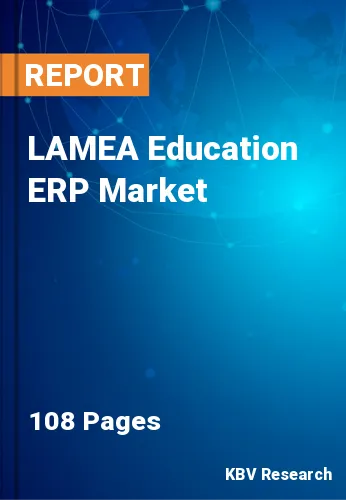The Latin America, Middle East and Africa Education ERP Market would witness Market growth of 16.1% CAGR during the forecast period (2022-2028).
The education ERP industry is relatively new to the Market . ERP software has previously proven to be useful and successful in a variety of other industries. ERP aims to streamline an organization's goals by managing all of its resources. Private organizations can use ERP software to have a better understanding of their management, which is essential for transparent and effective operations.
The education ERP Market is projected to be driven by a large number of private institutions, an increased desire for transparent procedures, and growing competition for grants to improve education quality. The educational ERP Market is still in its early phases, but it promises a plethora of potential for all Market participants in the foreseeable future. While larger competitors' ERP software innovation and quality are critical differentiators, smaller players' service quality and affordability remain major draws.
The deployment of ERP for higher education in this region allows all aspects of the institution's operations to be connected and made "conversant" with one another. By automating operations, enhancing productivity, strengthening controls, and providing a user-friendly interface, these technologies save money of the educational institutes of this region.
Some private colleges in MEA nations, such as Saudi Arabia and the United Arab Emirates, have invested in online platforms and are well prepared for online learning. In developing Latin American countries as well affluent Middle Eastern countries, there are significant investments being made to improve human capital. This means more investments in educational institutes to make them more productive and efficient. The adoption of ERP in education is likely to grow because of its wide range of benefits. Countries like UAE and Brazil have a flourishing educational sector that draws international students from many different countries. In both these countries, education ERP is already in use in various institutions.
The Brazil Market dominated the LAMEA Education ERP Market by Country in 2021, and would continue to be a dominant Market till 2028; thereby, achieving a Market value of $639.8 million by 2028. The Argentina Market is anticipated to grow at a CAGR of 16.7% during (2022 - 2028). Additionally, The UAE Market would display a CAGR of 15.8% during (2022 - 2028).
Based on Component, the Market is segmented into Software and Services. Based on Application, the Market is segmented into Student Management, Academic Management, Human Resource Management, Finance & Accounting Management, and Stores, Procurement Management & Others. Based on Deployment Model, the Market is segmented into On-premise and Cloud. Based on End User, the Market is segmented into Higher Education and K-12. Based on countries, the Market is segmented into Brazil, Argentina, UAE, Saudi Arabia, South Africa, Nigeria, and Rest of LAMEA.
Free Valuable Insights: The Global Education ERP Market is Predict to reach $32.3 Billion by 2028, at a CAGR of 14.2%
The Market research report covers the analysis of key stake holders of the Market . Key companies profiled in the report include Microsoft Corporation, Oracle Corporation, SAP SE, Workday, Inc., Infor, Inc. (Koch Industries), Brainvire Infotech, Inc., Serosoft Solutions Pvt Ltd. (The Hindustan Group), Unit4 N.V. (Advent International), Ellucian Company L.P., and Jenzabar Inc.
By Component
By Application
By Deployment Model
By End User
By Country
Our team of dedicated experts can provide you with attractive expansion opportunities for your business.

